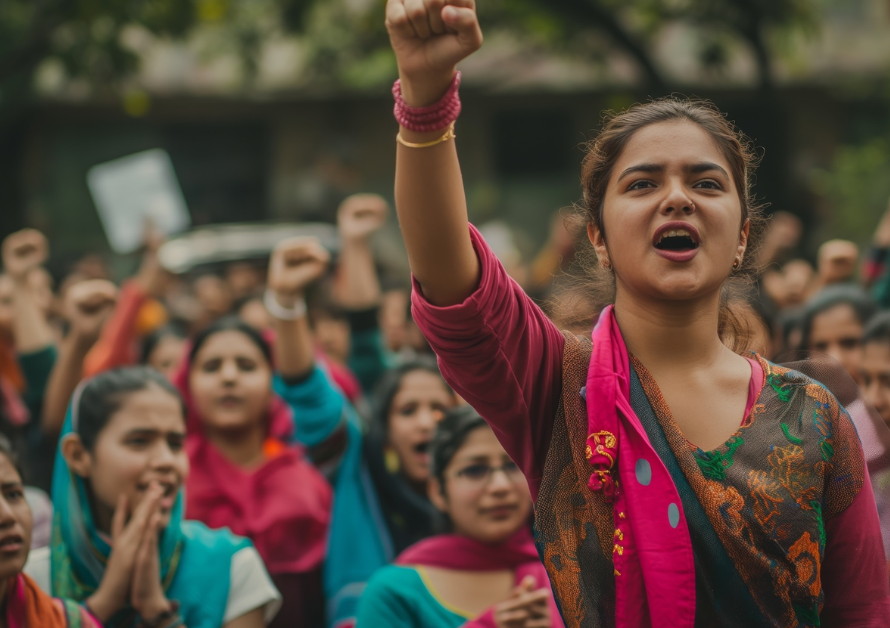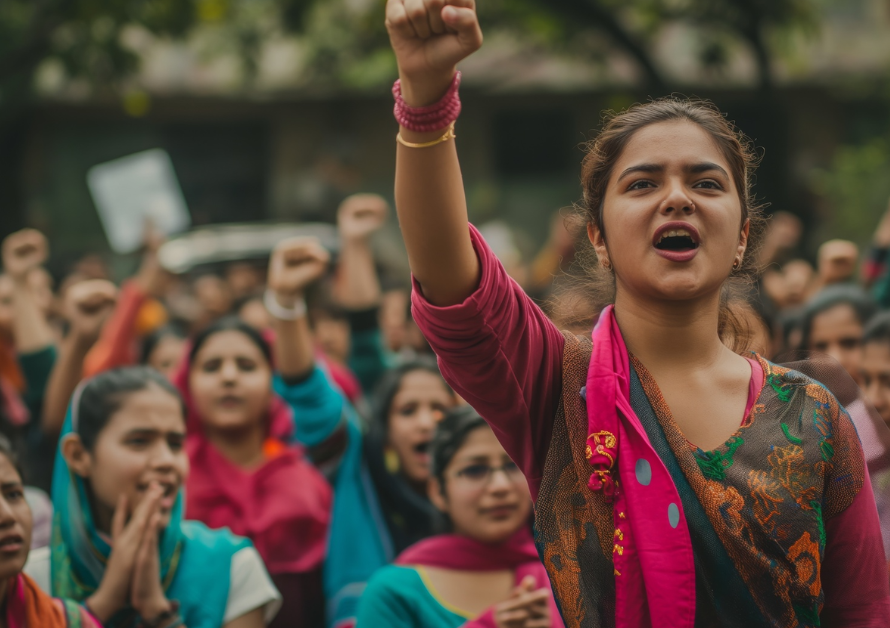Dear fellow Hindus,
I am sharing this message with deep concern and a sincere apology if it appears repetitive or unwanted by some members. However, I believe it is crucial for our survival as a community, for the preservation of Hindutva, and for the future of our Hindu nation. This is not just a request, but an urgent appeal to all of you to pause, reflect, and take action for the greater good of our people and our country.
Why We Must Unite: The Real Threat to Our Hindu Nation
As long as India remains a democratic Hindu-majority country, we can enjoy our freedoms, talk about universal brotherhood, and promote genuine secularism that respects all religions. However, if India were to become an Islamic state governed by Sharia law due to our own complacency and inaction, there would be no space for secularism, freedom of religion, or personal choice. We must learn from history: whenever Islamic rule took hold, there was a forced imposition of religion, suppression of dissent, and persecution of non-Muslims.
Look at what happened in Pakistan, Bangladesh, and Kashmir. The moment these regions adopted Islamic principles, Hindus faced unimaginable atrocities. They were forced to leave their homes, businesses, and everything they possessed, often fleeing with their lives. This cycle of violence and persecution has been repeated wherever Islamic fundamentalism has taken root. We’ve witnessed it in the violence against Hindus in Bangladesh and in the deteriorating situation for Hindus in Muslim-majority states like Kerala and West Bengal.
The 800 years of Muslim rule in India were marked by the destruction of temples, burning of scriptures, and merciless torture of Hindus who refused to convert. Are we prepared to let this history repeat itself in modern India?
The Role of Opposition Parties and Vote-Bank Politics
Despite knowing this history, our opposition parties have shamelessly pampered the Muslim community for vote-bank politics. They prioritize their personal and political gains over the safety and sovereignty of our Hindu nation. While they play with the fire of appeasement, we Hindus have remained silent, distracted by trivial matters like the price of tomatoes or free handouts. Many of us seem willing to support those who compromise our nation’s safety for the sake of temporary benefits, forgetting the lessons of history and the importance of protecting our culture and heritage.
This is a wake-up call. If we don’t learn from our past and fail to act now, our fate will be no different from the Hindus in Pakistan and Bangladesh within the next two to three decades—possibly even sooner if we allow the opposition parties to come to power and dismantle the progress made by the current government.
The Alarming Threat of Islamic Radicalization
The radical elements within the Muslim community are not hiding their intentions. They are openly sharing plans for violent attacks against Hindus, including threats to massacre devotees at the next Kumbh Mela. They have also launched “Mission 2047,” a dangerous agenda to celebrate 100 years of independence with India as an Islamic nation. Our opposition parties, blinded by their vote-bank politics, are supporting these radical elements. Their aggression is increasing, and unless we act decisively, we are digging our own graves.
An even greater threat comes from the traitor Hindus who, for their own selfish interests, are helping these opposition parties to win elections. Many Muslims and Christians have also adopted Hindu names to deceive and manipulate us. Throughout history, whenever Hindus have faced defeat, it was largely due to betrayal from within. We must be vigilant against such internal threats and address them with caution.
The Damage to Our Culture and Education System
For nearly two centuries, the British colonial rulers systematically destroyed our rich cultural heritage by imposing Western values. This damage was further exacerbated by the opposition governments, which placed the education ministry under Muslim control and banned the teaching of our own religion and culture in schools and colleges. Meanwhile, Christian convent schools and Muslim madrasas were allowed to teach their religious doctrines freely, radicalizing the youth and creating a generation disconnected from their Hindu roots.
As products of this flawed education system, many of us have lost touch with our own religion, culture, and heritage. We have become secular in name, without understanding the true meaning or implications of this secularism imposed by the opposition parties. They have fooled us into thinking we are wise, while in reality, we are being manipulated from the beginning of our lives.
The Time to Act is Now: The Choice is Ours
I may not have the perfect words to convey the urgency of this situation, but I sincerely request each one of you to reflect deeply on what I have outlined above. The bottom line is clear: Hindus need to protect themselves from the increasing threat of radical Islam, the appeasement politics of the opposition parties, and the betrayal of traitor Hindus who are undermining our efforts.
If we fail to take action now, we risk losing everything—our religion, culture, heritage, and even our lives. We will be remembered in history as the biggest fools who did not learn from the past, who were divided by petty differences, and who stood by as our great nation was destroyed from within.
The choice is yours: Stand united, act decisively, or face the consequences of inaction.
With deep concern, A Patriotic Hindu
Examples, Case Studies, and Next Steps for Hindu Unity and Survival
In light of the growing concern over threats to the Hindu community, culture, and the future of the nation, it is crucial to support the narrative with real-life examples, historical case studies, and clear, actionable steps. Here’s an expanded framework:
- Historical and Contemporary Examples
a. Partition of India (1947)
Example: The partition of India was a tragic event that saw widespread violence, forced conversions, and the displacement of millions of Hindus and Sikhs from what became Pakistan.
Impact: The creation of Pakistan as an Islamic state led to a mass exodus of non-Muslims, who faced persecution, violence, and atrocities. Over 14 million people were displaced, and it is estimated that over 1 million lost their lives.
Lesson: This incident shows the dire consequences of religious intolerance and the dangers of political appeasement at the cost of national integrity.
b. Exodus of Kashmiri Pandits (1990s)
Example: In the early 1990s, Kashmiri Pandits were forced to flee their ancestral homes in the Kashmir Valley due to threats, violence, and religious persecution by Islamic extremists.
Impact: An estimated 100,000 to 150,000 Kashmiri Pandits became refugees in their own country. Their properties were looted, temples were desecrated, and many were killed for refusing to convert.
Lesson: This case demonstrates the vulnerability of the Hindu minority in a region influenced by radical Islamic ideologies. It highlights the need for stronger measures to protect religious minorities in areas with rising extremism.
c. Anti-Hindu Violence in Bangladesh
Example: Hindu communities in Bangladesh have faced recurring incidents of violence, including attacks during the Durga Puja celebrations, destruction of temples, and forced conversions.
Impact: The Hindu population in Bangladesh has significantly declined from approximately 28% in 1947 to less than 8% today. Many have been forced to flee to India to escape persecution.
Lesson: This is a clear example of what happens when a state turns a blind eye to religious extremism. It underscores the urgent need for international awareness and pressure to protect minority rights.
d. Current State of Hindus in Kerala and West Bengal
Example: In states like Kerala and West Bengal, incidents of religious violence, forced conversions, and targeted attacks against Hindus have been reported, often influenced by radical elements and political appeasement.
Impact: The political atmosphere in these states has created a hostile environment for Hindus, with increased instances of violence during festivals and elections.
Lesson: The political and social climate in these states indicates the dangers of unchecked radicalization and the impact of vote-bank politics on communal harmony. - Case Studies on Political Appeasement and Its Consequences
a. Vote-Bank Politics in Uttar Pradesh (Pre-2017)
Case Study: Before the 2017 state elections, many political parties in Uttar Pradesh were accused of engaging in appeasement politics, focusing on minority communities for electoral gains while ignoring issues faced by the Hindu majority.
Impact: There was a noticeable increase in communal tensions, polarization, and incidents of religious violence. Issues like the forced migration of Hindus from Kairana due to threats and harassment became prominent.
Lesson: This case illustrates the negative consequences of divisive politics. It highlights the need for inclusive governance that addresses the concerns of all communities without favoritism.
b. Tolerance vs. Radicalization in the UK
Case Study: The UK has witnessed a rise in radicalization among certain Muslim communities, leading to tensions with the local Hindu and Sikh populations. Incidents of hate crimes, vandalism of Hindu temples, and clashes have been reported, especially in cities like Leicester.
Impact: The rise of radical Islamist groups in the UK has led to increased communal tensions and has sparked a debate about the failure of multicultural policies.
Lesson: This example shows the challenges faced by Hindu communities even in Western countries when radical ideologies are left unchecked. It highlights the importance of strong counter-radicalization policies. - Next Steps: A Plan of Action for Hindu Unity and Preservation
a. Strengthening Community Awareness
Education and Cultural Revival: Focus on reviving traditional Hindu education and cultural awareness among the younger generation. Promote Sanatan Dharma values, history, and scriptures in schools and community programs.
Workshops and Seminars: Organize events to educate Hindus about their history, heritage, and the importance of unity. Collaborate with temples and Hindu organizations for broader outreach.
b. Political Mobilization and Advocacy
Support Pro-Hindu Leadership: Encourage voting for leaders and parties that support Hindu values, national integrity, and the preservation of Indian culture.
Lobbying and Legal Action: Advocate for stronger laws against religious conversions through coercion, hate speech, and attacks on places of worship. Work with legal experts to protect the rights of Hindus.
Engage with Media and Social Platforms: Use media channels and social platforms to raise awareness about the challenges faced by the Hindu community and counter the narrative of appeasement politics.
c. Strengthening Local and Global Networks
National Hinduism Board: Build and expand platforms like the ‘National Hinduism Board’ to connect with like-minded individuals, organizations, and leaders who are dedicated to preserving Hindu culture and values.
International Advocacy: Engage with international organizations and diaspora communities to raise awareness about the plight of Hindus in India and abroad. Highlight issues like the persecution of Hindus in Pakistan, Bangladesh, and other regions at international forums.
Collaborative Action with Saints and Gurus: Partner with spiritual leaders and religious organizations to unite Hindus under common goals of Dharma, Seva (selfless service), and Bhakti (devotion).
d. Countering Radicalization and Extremism
Strict Monitoring of Radical Groups: Advocate for stricter monitoring and action against radical Islamic groups, madrasas involved in spreading extremism, and individuals promoting anti-Hindu sentiments.
Community Vigilance: Form local groups for community vigilance, particularly in sensitive areas. Encourage reporting of any suspicious activities or hate speech aimed at dividing communities.
e. Promoting Unity Beyond Caste and Sect
Campaign for Unity: Launch a national campaign emphasizing “Hindu Ekta” (Hindu Unity), encouraging people to rise above caste, sect, and regional differences.
Support Social and Economic Welfare: Promote welfare schemes aimed at uplifting the marginalized sections within the Hindu community to reduce internal divisions and build a stronger, united front.
Conclusion: Time for Collective Action
The time for passive observation has passed. We, as a community, must rise together, learn from history, and take decisive action to protect our culture, religion, and nation. Let us remember the teachings of Swami Vivekananda: “Arise, awake, and stop not till the goal is reached.”
The choice is clear: Unite and act now, or face a future where our heritage is lost.
Let us choose wisely for the sake of our ancestors, our future generations, and the sanctity of our Dharma.
A Concerned Patriotic Hindu







